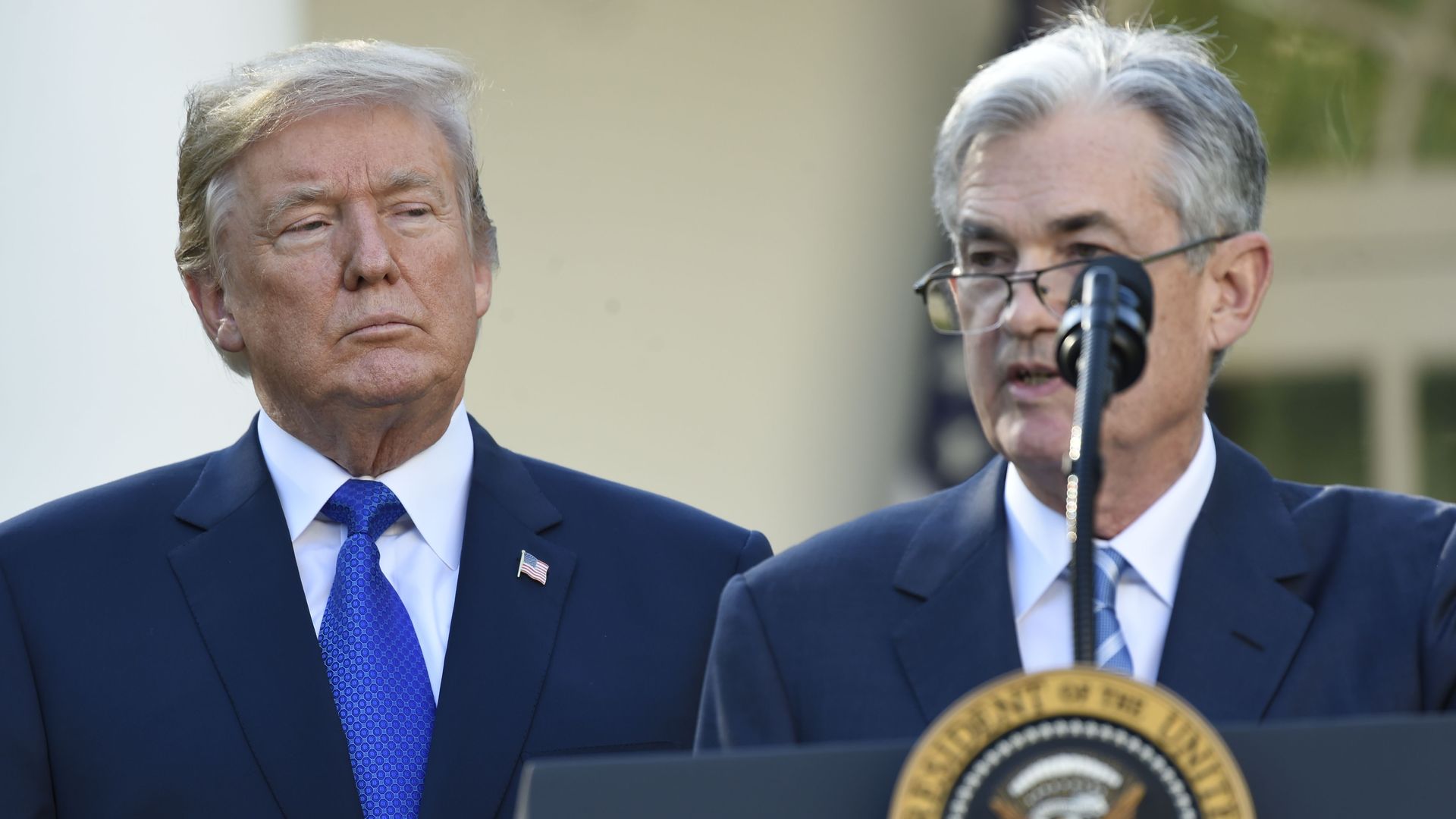One way to fight a coronavirus recession: $1,000 for every American
Add Axios as your preferred source to
see more of our stories on Google.

Jerome Powell and President Trump in 2017. Photo: Saul Loeb/AFP via Getty Images
Now that the Federal Reserve has fired its monetary policy bazooka — announcing Sunday the second emergency interest rate cut in as many weeks, this one taking rates effectively to zero — expect the drumbeat for fiscal stimulus to pick up, as more economists pound the table for government action.
What's happening: On Monday, Sen. Mitt Romney (R-Utah) joined a growing chorus of liberal and conservative economists are lining up behind a proposal published in the Wall Street Journal by Harvard professor Jason Furman, who chaired the Council of Economic Advisers (CEA) under President Obama, that calls for direct government payments of $1,000 to every American adult.
- Romney said that the idea would "help ensure families and workers can meet their short-term obligations and increase spending in the economy."
What it means: Furman proposes Congress pass a "one-time payment of $1,000 to every adult who is a U.S. citizen or a taxpaying U.S. resident, and $500 to every child who meets the same criteria."
- He adds that the law "should also specify that the payments would continue in 2021 and beyond if the unemployment rate rises to 5.5% and remains there or higher. Hopefully this will not happen, but if it does, the money will be needed."
- "The comprehensive and dynamic response should also include extensions of unemployment insurance and increased Medicaid matching for states. These would be passed pre-emptively, so that they could trigger automatically in states where unemployment rates rise."
The proposal for direct payments to households also has been backed by noted conservatives Michael R. Strain and Scott Gottlieb of the right-leaning American Enterprise Institute, who advocate for direct payments that are "temporary and only for states experiencing severe outbreaks."
Why it matters: Market watchers of all stripes agree that the Fed's tools alone are insufficient to counter the damage likely to be done to the U.S. economy from the coronavirus outbreak and shutdown of businesses that has already begun.
- Fed chair Jerome Powell admitted as much during his press conference Sunday, saying,"We don’t have the tools to reach individuals and particularly small businesses and other businesses and people who may be out of work."
- "I think fiscal policy is a way to direct relief to particular populations and groups ... we do think fiscal responses are critical."
The bottom line: "The issue is not aggregate demand but social insurance," N. Gregory Mankiw, a Harvard economics professor who served as CEA chair under George W. Bush, told Axios in an email Thursday.
- "You need to help people get over a time when working is impossible for some occupations, and to discourage people who have symptoms from leaving their homes just to get a paycheck. $1000 per person sounds about right."
- (Mankiw expanded on these thoughts after "several reporters emailed" him in a blog post on Friday.)
But, but, but: Many are worried that Congress and the White House have become too dysfunctional to take bold action and are expecting to see the Fed forced to push forward with helicopter money — effectively the same policy, but instituted by the unelected U.S. central bank rather than the country's politicians.
Former Fed senior economist Claudia Sahm warns that using helicopter money could be dangerous, and is seen as "the nuclear option" inside the Fed.
- "The political ramifications of the Fed essentially printing money and giving it to people — there are ways to do it, but the problem is if the Fed does this and Congress still has not passed anything ... that would mean the Fed has stepped in and done something that Congress didn’t want to do," she tells Axios.
- "If they did helicopter money without congressional approval, Congress could, and rightly so, end the Fed."
- "I really don’t want Congress or the administration to think that’s a real option," she adds. "It’s un-American in the sense that we have a democracy and elected officials. We shouldn’t be using that."
Go deeper: Why the Fed action matters
